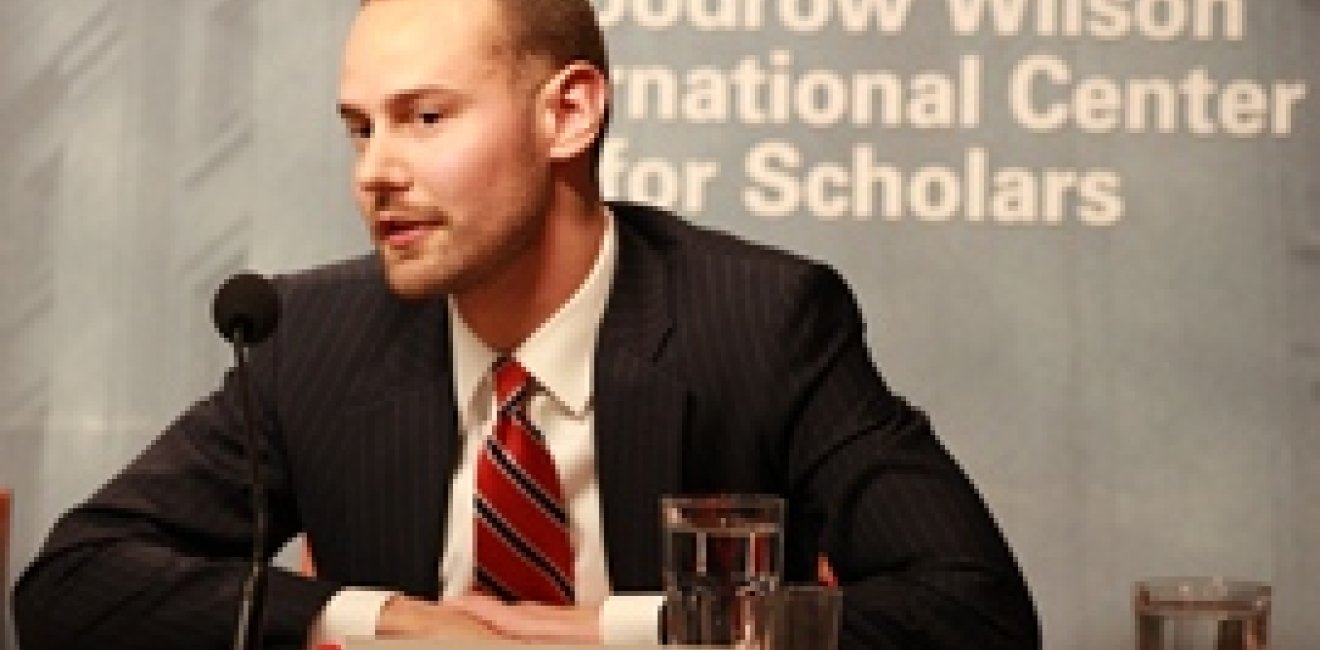The Wilson Center is shocked and saddened to learn of the death of Alexandros Petersen, who died in an attack on a restaurant in Kabul last week. "Alex was a much-liked and highly respected colleague. We mourn his passing and send our condolences to his family and friends," said Christian Ostermann, head of the Center's Global Europe Program, who had worked closely with Petersen.
Alex had been part of the Wilson Center community for several years. He served as an advisor on energy security issues to the Wilson Center's Global Europe Program since 2010 and had also been a Wilson Public Policy Scholar and a visiting scholar with the Center’s Southeast Europe Project.
Alex was an expert on energy politics, Central Asia and the Caucasus and ran the hugely popular blog chinaincentralasia.com. "He was an exceptionally talented, energetic and courageous young man, passionate about his work, someone who literally ‘walked the walk’ – constantly traveling to the regions that were of core concern to him. He was doing excellent work and I will miss his wise counsel, enthusiasm and partnership," said Ostermann.
The Center will not forget his commitment to scholarship and public policy, a commitment that often took him to distant and sometimes dangerous places in pursuit of knowledge.
Related Stories Remembering Alex
In Memoriam: Alexandros Petersen, Murdered By The Taliban In Kabul (Forbes)
Intellectually, what struck me about Alex was his seemingly effortless command of something so few scholars achieve: the combination very deep expertise in a particular domain–in this case, the intricacies of energy politics in the Caucasus–and the ability to connect that narrow expertise with the broader questions of the entire field–here, geostrategy.
Alexandros Petersen attended Georgetown Day School in Washington D.C. and recently worked at the Woodrow Wilson Center before moving to Afghanistan. Petersen, known by some as Alexi, is being remembered as a brilliant scholar on international relations and energy geopolitics.
In memory of my friend Alexandros Petersen – a victim of the Taliban (The Spectator)
The victims included a Labour party candidate for the forthcoming European elections, the IMF’s country director and a young Afghan couple. They also included a friend and colleague, Alexandros Petersen. Educated in London, Alex worked for some years at the Henry Jackson Society as well as at the Atlantic Council and the Woodrow Wilson Center. He had recently joined the political science faculty of the American University in Afghanistan.
Alexandros Petersen Killed in Taliban Attack (Outside the Beltway)
Last night I received an email from my friend Raheem Kassam to tell me that Dr Alexandros Petersen had been a victim of the blast. Raheem had introduced me to him a few months ago as he wanted to publish a biography of the Georgian leader Mikheil Saakashvilli. It was a really sound proposal and we agreed it would come out on the 5th anniversary of the events in South Ossetia in August this year. All was going well. He had secured John McCain to wrote a foreword and writing was proceeding with his co-author Richard Cashman.
University Mourns Loss of Colleagues and Friends (American University of Afghanistan)
The American University of Afghanistan (AUAF) confirmed this morning that two American employees – Alexis Kamerman and Dr. Alexandros Petersen - died in the attack on La Taverna du Liban, a popular Lebanese restaurant in the heart of Kabul.“We are devastated by the news,” said Dr. Michael Smith, president of AUAF. “Our deepest sympathies go out to the families and to the AUAF community.”
You find two kinds of people in his field: those for whom foreign affairs are a projection of their domestic politics, and those who love the regions and peoples to which they devote their work and study. Alex of course was one of the latter. He shared this with journalists and aid workers who would have disagreed with him most strongly.
Alexandros had just started a new job as a professor at the American University in Kabul. He was an incredibly talented student of international politics and geo-strategy, as this blogpost, written only a week ago, demonstrates. A young life has been cut tragically short by the actions of Taliban terrorists. All of us at Biteback send our heartfelt condolences to his family and friends.
A Taliban suicide bomber and gunmen attacked a restaurant popular with foreigners in the heart of the Afghan capital Kabul, according to the New York Times. There were 13 foreigners among those killed, including Advisor to Global Europe Program at the Woodrow Wilson International Center for Scholars, a friend of Azerbaijan, Alexandros Petersen.
"We offer our condolences to all the relatives of the deceased", he said adding that Azerbaijan, as a state, who suffers from terror, condemns any forms and manifestations of terrorism. Elman Abdullayev also extended condolences to the relatives of energy expert Alexandros Petersen, a friend of Azerbaijan, who died in a terrorist attack in Kabul.
The Atlantic Council mourns the death of Alexandros Petersen, a victim of Friday's terrorist attack in Kabul that killed twenty-one people. Petersen was a former fellow for transatlantic energy security and associate director of the Council's Dinu Patriciu Eurasia Center, and had been serving in Kabul as a professor at the American University of Afghanistan. We send our condolences to his family, friends, and colleagues on the loss of a young man who followed some of the world's most challenging issues with enormous passion and an intrepid nature.
Three Americans killed in a brutal commando-style attack on a popular Kabul restaurant were being remembered Sunday as innocent civilians helping Afghanistan build a better future. Two of the victims — Alexis Kamerman and Alexandros Petersen — were educators working for the American University of Afghanistan, while the third, Basra Hassan, was a UNICEF nutrition specialist.
Two employees of the American University of Afghanistan -- one an internationally respected political scientist and the other an idealistic young student affairs officer -- were among the 21 people killed Friday in a Taliban attack on a restaurant in Kabul frequented by foreigners working in the area.
There is no student to whom I’ve ever felt more gratitude. He could have sat there and thought “I know more than this teacher, so why am I in this class…?” but instead he devoted himself to helping me learn how to teach the class. He was a remarkable student and a remarkable person, and that was obvious at a young age.
Even those who didn’t know Petersen well lamented this week that the life and career of a bright, young scholar was cut short in its prime. His professional reputation was that of an expert who was proud to be an American, but cared most about understanding the perspective and history of the countries he was studying, not only from an American point of view.
The American University of Afghanistan has confirmed that Alexandros Petersen, a professor of political science there, died in the Saturday assault. Petersen, who had just arrived in Kabul, has family in Washington, university president Michael Smith said. “I liked him tremendously, he was a very giving person and also very intelligent,” Smith said. “He would have been a fantastic professor for us. It’s such a tragedy to have people so early in their lives lose the opportunity to contribute in the way they wanted to contribute."
It is with great sadness that RUSI notes the passing of Dr. Alexandros Petersen this past weekend in Kabul. Alexandros was a brilliant young scholar of geopolitics and Eurasia and his loss is felt keenly across London's academic, policy and journalist community, including many colleagues at RUSI.
A scholar of Central Asia, Petersen was by all accounts living out his dream when he accepted a job teaching political science at the American University of Afghanistan. He left Washington, his home base when he wasn’t traveling the world researching energy geopolitics, for Kabul this month.
Dr. Alexandros Petersen was a scholar of energy geopolitics and a member of the American University of Afghanistan’s political science faculty, and he also served as an advisor to the European Energy Security Initiative at the Woodrow Wilson International Center for Scholars.
Alexi said, 'That’s my book.' I looked at him in disbelief. I flipped through the pages and realized this was an academic book and I didn’t understand anything in it. I thought this was a joke. But he wasn’t laughing. And then it all made sense. We all knew that Alexi had this other side to him—a professional and serious side—but it wasn't until that moment that I really understood just how impressive of a person he truly was.
You’ve heard of The Most Interesting Man in the World, the debonair but fictitious spokesman for Dos Equis beer. Alex Petersen was The Most Interesting Man in D.C. Like his fictional counterpart, Alex was brains and brawn, intensely charming, an irresistible conversationalist—and always more than a little mysterious. You never knew exactly where you’d see Alex next, or when you might get a missive from London, Baku, or Tbilisi.
Petersen’s clear voice and analytical acumen, manifest in these spaces in recent years as well as in other publications of note, constituted a significant contribution to the discourse of our time on geopolitical matters that fell within his purview. That voice and that analytical acumen will be missed.
As an occasional journalist, I had known ‘Alex the source’ – always reliable for an astute and erudite quote – for some time before I knew Alex the person. While the first Alex will leave a gaping hole in the rolodex of many analysts and reporters covering Central Asia and the Caucasus, it is the second Alex, known by family, friends, colleagues and students, that will be missed even more.






